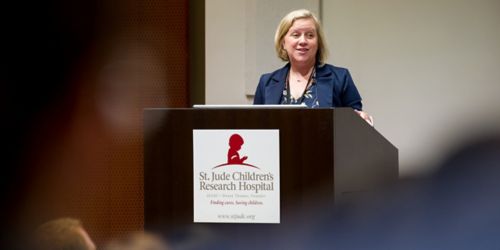St. Jude Family of Websites
Explore our cutting edge research, world-class patient care, career opportunities and more.
St. Jude Children's Research Hospital Home

- Fundraising
St. Jude Family of Websites
Explore our cutting edge research, world-class patient care, career opportunities and more.
St. Jude Children's Research Hospital Home

- Fundraising
Experiences as a volunteer shaped Crabtree’s professional career

Valerie Crabtree, PhD, spoke with a school psychologist when she was in the sixth grade. He talked with her about considering graduate school and earning a PhD.
Valerie Crabtree, PhD, chief of Psychosocial Services at St. Jude, learned about being a psychologist when she was in elementary school. By the time she was in high school, volunteering at a Dallas hospital sealed her decision to care for hospitalized children. This is part of an ongoing series.
Describe the events that resulted in your decision to work with children.
I learned about being a psychologist as a job when I was in the fifth grade. I thought it sounded interesting. As a sixth-grader, I was volunteering in the school office and met a school psychologist, who talked to me about going to graduate school to earn a PhD. I decided at that moment that is what I would do. While volunteering at Scottish Rite Hospital in Dallas as a high school student, I decided I wanted to work with hospitalized children.
Was there a person early in your career who changed your professional path?
Joan Chesney, MD, was a mentor to me. As the former vice president of the clinical education and training office at St. Jude, she helped me find my own path as the psychology training director. This meant training pediatric psychology students, interns, and fellows in ways that were professionally meaningful to me and not necessarily based on others’ expectations. She also was exceedingly supportive of staff being thoughtful about balancing work and life. She helped me find self-confidence as I took on a new role. That has been invaluable as I take on new roles and new challenges. Because of her mentorship, I continually draw on lessons learned — to make my own decisions, follow my own ethical/moral compass and continue integrating my work and professional life.
What do you know now you wish you’d known when you began?
I wish I had known that it really is OK to not know the answer to something and that asking for help is the best way to find out. Early in my career, I thought I needed to “know” everything I was asked. It’s a lot of pressure, it’s unrealistic and it can lead to making unnecessary mistakes.





